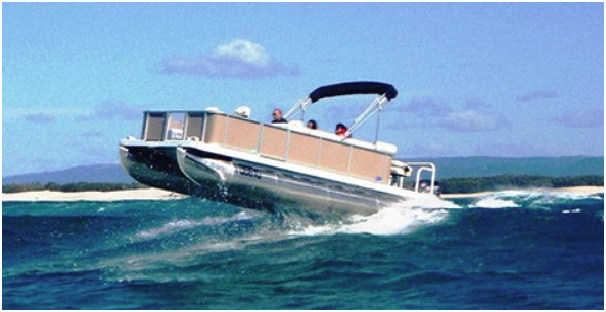If you are considering purchasing a pontoon boat, you are probably concerned about how well it can handle in choppy or rough waters? Your concerns are valid especially if you reside in a region where there is unpredictable weather or you do not have enough boating experience.
Pontoon boats handle quite well in choppy and rough waters as well as in windy conditions thanks to their design. They have two hulls that enable them to sit on top of the wave to maintain stability unlike mono-hull vessels which sit in the wave. This gives you a huge advantage whilst sailing in a pontoon because the water displacement is much different than in traditional style boats.
Pontoon boats have a smaller water displacement, which means the boat cuts through less water as it sails. This also means the impact of rough waves is negligible. Most of the time your pontoon boat will remain stable without wobbling uncontrollably in the water. Unfortunately, in extreme weather storms it could actually be more dangerous than a regular boat with V-shape hull.
It is necessary to apply common sense. When sailing your pontoon in windy weather conditions, common sense is your best tool. This does not change the fact that you need knowledge on what you’re supposed to do when the water gets choppy.
Generally, pontoons handle much better in rough waters than other types of recreational boats. Because they are built with at least two hulls they have greater stability is provided than in a one hull boat. If Pontoons, with two tubes, are more stable than mono-hulls; imagine the amount of stability you could get from a tritoon with a third tube.
Pontoon boats are generally safe but applying common sense will take you much further when sailing. Aside neglecting your common sense, another thing that could get you in trouble whilst sailing a pontoon is not having experience or knowing how to handle a pontoon when in rough waters.
Pontoons can somersault and this happens frequently. Responsible owners monitor the weather forecast and avoid risky situations where their pontoons are likely to capsize. If your pontoon gets hit by a huge wave from the font, your pontoon could either go under the wave instead of on top of it and this could lead to it capsizing, somersaulting or tipping over. Pontoons just like any other boat are not to be sailed under certain weather conditions. Extreme and severe weather conditions are to be avoided.
Pontoon boats can be more dangerous than their multi-hall counterparts in cases of extreme weather where the water is very choppy. It is also necessary to know that no matter the vessel you use, if there’s a storm approaching you should get ashore or to a safe location as quickly and safely as you can.
Keeping your pontoon boat steady and safe in rough waters
Make sure your weight is balanced evenly
You need to ensure that you maintain an even weight load on your vessel and you also educate your passengers on why it is important to maintain balance in pontoons especially when the water is rough. Equipment, cargo and passengers all add to the weight of your boat. Modifications and additional customisations also impact the weight of your pontoon. It is necessary to know if any of your customisations affect your pontoon’s centre of gravity. If the centre of gravity in your pontoon is off, then it is very likely to tip over in rough waters.

Modifications
If you expect to run into choppy waters on a regular basis in your pontoon or you just want to ensure your safety at all times, it helps to make modifications that assist you in sailing through rough waters.
These modifications include;
- Inserting power assisted steering device
- Mounting a higher horsepower engine
- You should also consider under-skinning. The addition of aluminium sheets underneath your pontoon is known as under skinning. This will help minimise water spray, debris damage underneath your boat and drag.
- Inserting positive angle lifting strikes. These gadgets are used to give your boat more lift. They help improve handling in rough waters and increase speed.
- Attach Barracuda nosecones. These devices increase efficiency and make the ride smoother.
Monitor the weather
Whenever there is a storm you should avoid being out on the water in a recreational boat. It is necessary to check the weather forecast before heading out to sea. If you notice a storm approaching you should get to shore or a safe location immediately. The faster you act the less likely you are to put yourself or passengers in a dangerous situation.
Whilst heading back to shore it is necessary to prepare for the possibility of a difficult docking. Pontoon boats can be large and bulky; they also have high profiles which make them difficult to dock during storms. Strong winds can push the boat against the side of the docks. Place bumpers on the side of your boat to protect it from damage in case strong winds push it against the dock.
